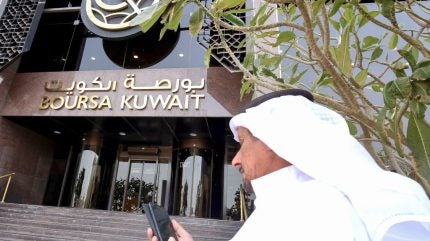

Kuwait has a population of about 4.4 million and is just 18,000km² in size, yet recorded a GDP of about $135bn in 2019, largely thanks to having the sixth-largest oil reserves in the world.
According to OPEC, the country’s oil and gas sector accounts for about 40% of its GDP and about 92% of export revenues.

Discover B2B Marketing That Performs
Combine business intelligence and editorial excellence to reach engaged professionals across 36 leading media platforms.
Foreign direct investment (FDI) plays a relatively small role in Kuwait’s economy, with a total FDI stock of about $15bn in 2019, equivalent to 10.9% of its GDP, according to the United Nations Conference on Trade and Development (UNCTAD). In comparison, FDI stock represented 78% and 29.8% of GDP in Bahrain and Saudi Arabia, respectively.
FDI flows are both limited and declining in Kuwait, however. UNCTAD data shows the country’s FDI inflows dropping each year since 2016 and totalling a mere $104m in 2019.
FDI and Kuwait’s Vision 2035
Like other Gulf states, Kuwait is looking to open up its economy and become less dependent on oil revenues, identifying foreign investment as a key tool in achieving those aims.
Launched in 2017, the government’s Vision 2035 seeks to turn Kuwait into a leading commercial and financial hub, improve employment opportunities for Kuwaiti nationals, and upgrade the country’s infrastructure.

US Tariffs are shifting - will you react or anticipate?
Don’t let policy changes catch you off guard. Stay proactive with real-time data and expert analysis.
By GlobalDataSince the launch of Vision 2035, Kuwait has risen from 102nd to 83rd in the World Bank Doing Business rankings. According to the World Bank, Kuwait also now scores far higher than the regional Middle East and North African average for ease of starting a new business, though it lags behind both Bahrain and Oman.
Kuwait has long sought to deliver major infrastructure improvements via public private partnerships (PPPs), though its PPP programme, first launched in 2008, has delivered few completed projects to date.
In the financial year ending 31 March 2019, Kuwait attracted 10 direct investments by foreign-owned companies, according to the Kuwait Direct Investment Promotion Authority (KDIPA). Since it started operating in 2015, KDIPA says it has approved direct investments worth $3.1bn (Kd960m) from 37 investment entities.
To meet its long-term objectives, Kuwait will need to grab a larger slice of a shrinking FDI market, given the economic impacts of Covid-19, while competing with regional neighbours, which have similar diversification ambitions.



